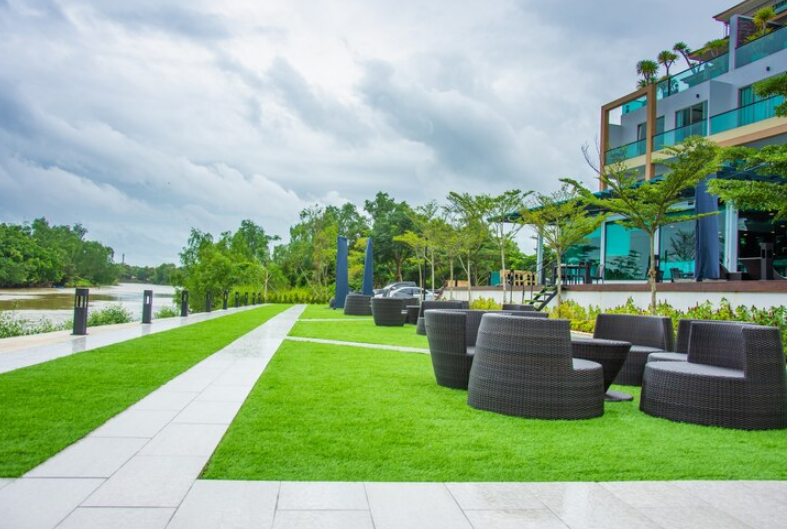Dubai, renowned for its breathtaking architecture and vibrant urban landscape, is also making significant strides in green initiatives and sustainable landscaping practices. As the city continues to grow and evolve, there is a growing emphasis on creating outdoor spaces that not only enhance the aesthetic appeal of the city but also promote environmental sustainability and resilience. In this article, we explore the innovative sustainable landscaping practices that are greening the city of Dubai, transforming it into a model of eco-friendly urban living. For more information check out best landscape companies in dubai
- Native Plant Selection: One of the cornerstones of sustainable landscaping in Dubai is the use of native plants that are well-adapted to the region’s arid climate and soil conditions. Native species such as ghaf trees, acacias, and desert shrubs require minimal water and maintenance, making them ideal choices for landscaping projects. By incorporating native plants into urban landscapes, landscapers can reduce water consumption, promote biodiversity, and create habitats for local wildlife, all while preserving the natural beauty of the desert environment.
- Xeriscaping Techniques: Xeriscaping, a landscaping approach that focuses on water conservation and sustainability, is gaining popularity in Dubai’s arid climate. By implementing xeriscaping techniques such as soil amendment, mulching, and efficient irrigation, landscapers can create beautiful and resilient outdoor spaces that thrive with minimal water usage. Drip irrigation systems, rainwater harvesting, and greywater recycling further enhance water efficiency, allowing landscapes to flourish even in the desert heat while reducing strain on freshwater resources.
- Green Roof and Vertical Gardens: Green roofs and vertical gardens are innovative solutions that integrate vegetation into the built environment, providing numerous environmental benefits. Green roofs help to reduce the urban heat island effect, improve air quality, and mitigate stormwater runoff by absorbing rainwater and reducing runoff. Vertical gardens, also known as green walls or living walls, offer similar benefits while maximizing green space in dense urban areas. These green infrastructure features not only enhance the aesthetic appeal of buildings but also contribute to the overall sustainability and livability of the city.
- Smart Irrigation Systems: Smart irrigation systems are revolutionizing landscaping in Dubai by optimizing water usage and reducing waste. These systems utilize sensors, weather data, and advanced algorithms to deliver water precisely where and when it’s needed, minimizing runoff and evaporation. Automated controllers, soil moisture sensors, and weather-based scheduling ensure that plants receive the right amount of water, promoting healthy growth and reducing water bills. By embracing smart irrigation technology, landscapers can create sustainable outdoor spaces that thrive in Dubai’s challenging climate.
- Permeable Paving and Sustainable Materials: Permeable paving materials, such as pervious concrete, permeable pavers, and gravel, allow rainwater to infiltrate the soil, reducing stormwater runoff and replenishing groundwater supplies. These sustainable materials help to mitigate flooding, prevent erosion, and improve water quality in urban areas. Additionally, using recycled and locally sourced materials in landscaping projects reduces carbon emissions associated with transportation and minimizes environmental impact. By incorporating permeable paving and sustainable materials into urban landscapes, Dubai is paving the way for a greener and more resilient future.
- Community Engagement and Education: Community engagement and education play a crucial role in promoting sustainable landscaping practices and fostering a culture of environmental stewardship in Dubai. Through workshops, seminars, and outreach programs, residents and businesses are empowered to make informed decisions about landscaping practices and water conservation. Community gardens, green spaces, and parks provide opportunities for hands-on learning and recreation, fostering a sense of connection to nature and promoting social cohesion. By engaging the community in sustainable landscaping initiatives, Dubai is building a more sustainable and resilient city for future generations.
In conclusion, sustainable landscaping practices are playing a vital role in greening the city of Dubai and promoting environmental sustainability and resilience. By embracing native plant selection, xeriscaping techniques, green infrastructure, smart irrigation systems, permeable paving, and community engagement, Dubai is leading the way in sustainable urban development. With a commitment to innovation and environmental stewardship, the city is transforming its landscape into a vibrant and sustainable oasis in the desert
Stay in touch to get more updates & news on Gossips!




